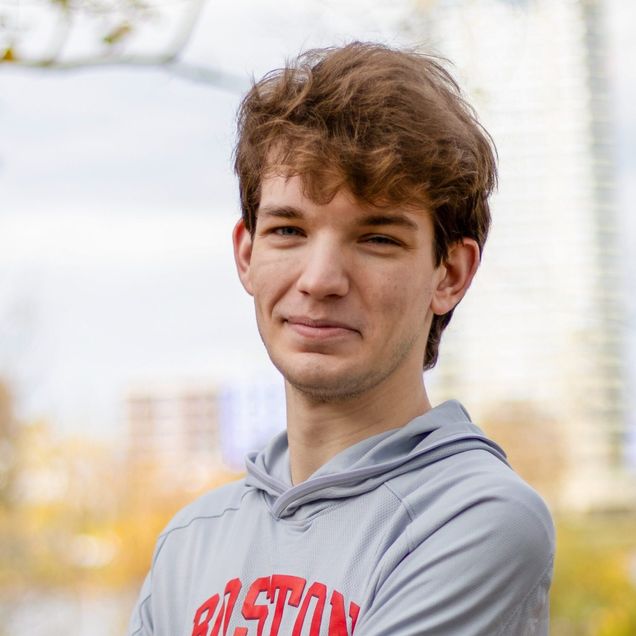The Boston Marathon isn’t ready for Boston University College of Arts & Sciences Student Body President Tyler Critz.

Originally from Hollis, New Hampshire, Critz spent his first year at Boston University distance learning from home through the university’s COVID-era “Learn From Anywhere” program. While he enjoyed spending his time outside of class skiing, his arrival to campus in his sophomore year would open a new world of opportunity. Critz has served on the CAS Student Government since his sophomore year, worked as a student research assistant in Associate Professor of Biology John “Chip” Celenza’s lab, and is running the Boston Marathon during his final semester at BU.
Following graduation, Critz is considering both pursuing a Ph.D. and entering the workforce straight away. He intends to gain more lived experience in different locations and eventually open a firm for transformational technology.
Arts & Sciences caught up with Critz, who is majoring in psychology and biochemistry and molecular biology.
Interview responses have been edited for clarity.
Arts & Sciences: Why did you choose your majors?
Critz: I came in as a biology major with a specialization in genetics, but I switched almost instantaneously to biochemistry and molecular biology. The classes seemed more enjoyable and that was also where I could also study chemistry.
I took Psychology 101 as a Hub class my sophomore spring and fell in love with it. I had an awesome professor and she really opened the world of psychology to me. Initially, psychology was just my minor, but I thought, ‘Why not pick up a second major?’
What is your role in CAS Student Government and what has your focus been this year?
I am the president for the 2023-2024 school year and I have been in student government for three years. Over the past three years, a couple of the big things I’ve noticed have been that while we have hit our mark in providing events, merchandise, and opportunities to the CAS community, we don’t do the best job of working within our community to fortify bonds. One of the benefits and difficulties of CAS is that we are comprised of many different departments. CAS is unlike the School of Engineering, where they can all come around engineering, or the School of Communication, where they can all come around communications. There is a difficulty in CAS with the fact that a lot of people who are studying liberal arts or English have absolutely nothing to do with people studying biology. The big goal this year has been to work with other organizations on campus and diversify our portfolio of events to make sure that we are serving the entire CAS student body.
Can you talk about taking on the Boston Marathon?
This was an idea I floated to my [CAS Vice President of Student Affairs] Matt Lutkins (CAS’25) over this past summer. It was kind of a joke but seemed like a good idea. I’ve been known in my friend group for running, typically incredibly late at night. I’m the king of the 2 am to 6 am run. I chose to run in the Boston Marathon with the organization I’m running for, Back On My Feet, because it was an opportunity to help support a cause and the marathon has always been a goal of mine.
It has been a great experience training and learning about the organization that I’m supporting. I’m able to raise money and share those stories. Back On My Feet is a nationwide organization combating homelessness by providing a support network and promoting healthy and active habits to ensure that those suffering from homelessness have an access point to move forward.
Can you describe your experience in research this year?
I’ve started research for credit this year working with Chip Celenza in his lab. We study the mutant genetics of a plant called Arabidopsis, a sort of mustard green. We are looking at its defense mechanisms to see if there’s anything that can be used for applicability anywhere from agricultural, to biofuel development, to everything in that vein. It is very cool.
Can you talk about connecting your education to sustainability?
My hope for sustainability in the future is that it will become something that is not talked about as a new special thing, but something that can become integrated into daily life. The major issue with most innovations and most progress is that it requires a significant change from the consumer. Being able to provide a real alternative option is something that I hope to do.
My goal is to get into transformational technology, which is the idea that you build products that will naturally plateau and no longer be useful. It’s a way of keeping myself honest and continuing to push myself to find a new problem. From the perspective of sustainability, it’s the idea that you slowly build a product to treat the symptoms, while also in the background making sure that you’re fixing the root problem and not continuing those symptoms.
What are your goals for after graduation?
It’s always funny because people ask me about my career goals and my answer is that I don’t have career goals, I have expectations of myself. My main goal is to be somebody that people can look at and say, “He is kind,” “He is good,” and “He is somebody that I want to interact with.” I want to be somebody that people are comfortable interacting with and who they can trust to be genuine and taken at face value. I want to be somebody where you’re never waiting for the other foot to drop, where you can just say “That is Tyler Critz, and this good thing that he is doing or these initiatives that he’s pushing are from a place of good.”
Hear more from Critz about his BU experience in a new Senior Spotlight video.
Interview by Shelby Rose Long (COM’27)